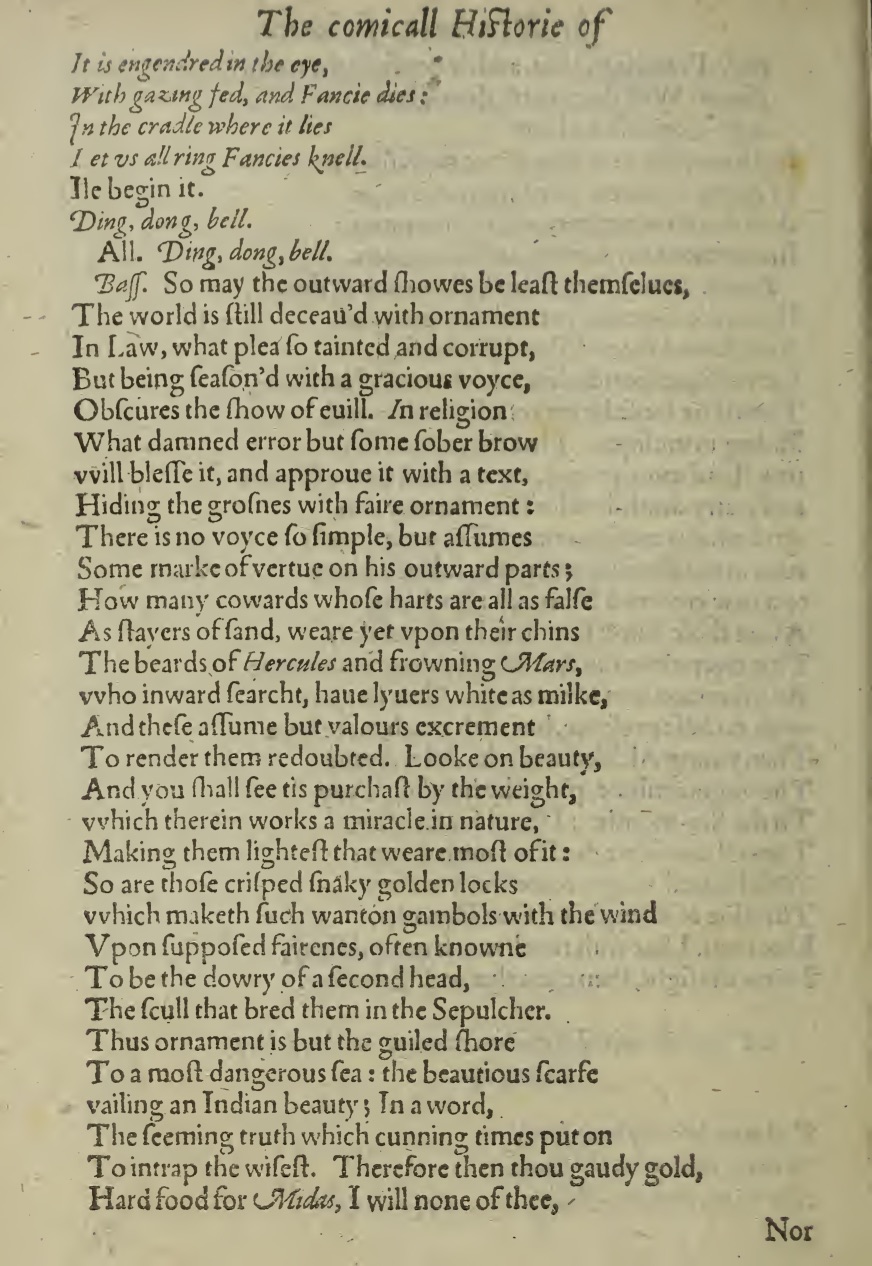Editorial note
This page spotlights the nature of editorial work and the by producing a simplified edition of this passage from early modern works with special emphasis on the religious undertones scattered across the passage. It has been tailored to the young adult audience; including college students. The color coding throughout this transcription indicates the various changes that have been made. Letters and words that have been colored red indicate changes in spelling, primarily the elimination of the letter ‘e’ at the end of a word (e.g. from “faire” to “fair”). Punctuation and letters that have been colored blue indicate grammatical changes, primarily changes in plurality and punctuation, with strikethroughs indicating the removal of punctuation. (e.g. from “:” to “(:)”). Letters and words that have been colored green indicate the changes in letter shape and formation (e.g. from “vv” to “W,” or from “f” to “s”). Letters and words that have been colored purple indicate a religious reference (e.g. “bless it”).
The combined color-coded indication of both editorial changes and religious undertones provides evidence that Shakespeare’s intended references have carried through into the 21st century. Most notably, his references to Greek mythology, which have been intentionally kept italicized in this transciption. Hercules is the Greek god of heroes and strength. Mars is the Greek god of war. Midas, a symbol of greed, is the protagist of a myth in which he wishes that everything he touch turn to gold, only for it to terribly backfire on him. Shakespeare’s references to Greek Mythology are particularly interesting when you consider how his works may have drawn influence from them, just as many modern works of English have drawn influence from him.
It is engendered in the eyes,
With gazing fed(;) and fancy dies(:)
In the cradle where it lies.
Let us all ring fancy(’)s knell(.)
I(’)ll begin it.
Ding, dong, bell.
All. Ding, dong, bell.
Bassanio. So may the outward shows be least themselves(.)
The world is still deceive(‘)d with ornament(.)
In law, what plea so tainted and corrupt(,)
But, being seasone(‘)d with a gracious voice,
Obscures the show of evil(?) In religion,
What damnèd error(,) but some sober brow
Will bless it (,)and approve it with a text,
Hiding the grossness with fair ornament(?)
There is no vice so simple(,)but assumes
Some mark of virtue on his outward parts(.)
How many cowards whose hearts are all as false
As stairs of sand, wear yet upon their chins
The beards of Hercules and frowning Mars,
Who(,) inward searched(,) have livers white as milk,
And these assume but valour(’)s excrement
To render them redoubted. Look on beauty,
And you shall see (’)tis purchased by the weight,
Which therein works a miracle in nature,
Making them lightest that wear most of it:
So are those crisped snaky golden locks
Which maketh such wanton gambols with the wind(,)
Upon supposed fairness, often known
To be the dowry of a second head,
The skull that bred them in the Sepulcher.
Thus ornament is but the guiled shore
To a most dangerous sea : the beauteous scarf
vailing an Indian beauty ; In a word,
The seeming truth which cunning times put on
To entrap the wisest. Therefore then thou gaudy gold,
Hard food for Midas, I will none of thee(.)
Image credit: Rare Books & Manuscripts Department, Boston Public Library, copy G.176.16. The most excellent historie of the merchant of Venice. First Quarto. London: 1600.
Citing this page: Shakespeare, William. The Merchant of Venice, E4v. London: 1600. Cacodemon Digital Shakespeare. Edited by [your names]. Source edition: Rare Books & Manuscripts Department, Boston Public Library (copy G.176.16). http://cacodemonshakespeare.com/comedies/merchant/e4v.
